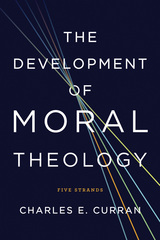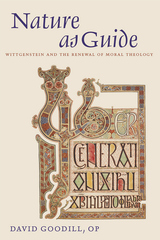
A Call to Fidelity seeks to thoughtfully examine and critically evaluate the contributions that Charles E. Curran has made to the field of Catholic moral theology over the past forty years. It also seeks to assess the development of specific topics in contemporary moral theology to which Curran has made his unique mark, particularly in fundamental ethics, sexual and medical ethics, social and political ethics, and topics related to dialogue with other traditions and approaches to Catholic ethics.
Reviewing the many years of his influential writings, thought, and scholarship, fourteen distinguished scholars examine his contributions and the current state of the topics under discussion-which are as far ranging as academic freedom, birth control, gay and lesbian relationships, and feminism. Each contributor also provides a critical evaluation of Curran's work and outlines how these areas will hold or undergo transformation as the church looks toward its relationship with society and culture in the coming decades.

Through the centuries, at the heart of Catholic moral theology is a fundamental question: How do we behave responsibly in the face of moral uncertainty? Attempts to resolve problems of everyday life led to the growth of a variety of moral systems, one of which emerged in the early 17th century and was known as "probabilism." This method of solving difficult moral cases allowed the believer to rely upon a view that was judged defensible in terms of its arguments or the authorities behind it, even if the opposite opinion was supported by stronger arguments or more authorities. The theologian Juan Caramuel, a Spanish Cistercian monk whom Alphonso Liguori famously characterized as "the prince of laxists," has been regarded as one of the more extreme—and notorious—proponents of probabilism. As the only full-length English study of Caramuel's theological method, Defending Probabilism seeks to reappraise Caramuel's legacy, claiming that his model of moral thinking, if better understood, can actually be of help to the Church today.
Considered one of the most erudite theologians of his age, a scientist and scholar who published works on everything from astronomy and architecture to printing and Gregorian chant, Caramuel strove throughout his life to understand probabilism's theological and philosophical foundations as part of his broader analysis of the nature of human knowledge.
In applying Caramuel's legacy to our own time, Defending Probabilism calls for a reconsideration of the value of provisional moral knowledge. Fleming's study shows that history matters, and that to attain any position on moral certitude is a difficult and painstaking process.

Charles Curran in his newest book The Development of Moral Theology: Five Strands, brings a unique historical and critical analysis to the five strands that differentiate Catholic moral theology from other approaches to Christian ethics—sin and the manuals of moral theology, the teaching of Thomas Aquinas and later Thomists, natural law, the role of authoritative church teaching in moral areas, and Vatican II. Significant changes have occurred over the course of these historical developments. In addition, pluralism and diversity exist even today, as illustrated, for example, in the theory of natural law proposed by Cardinal Ratzinger.
In light of these realities, Curran proposes his understanding of how the strands should influence moral theology today. A concluding chapter highlights the need for a truly theological approach and calls for a significant change in the way that the papal teaching office functions today and its understanding of natural law.
In a work useful to anyone who studies Catholic moral theology, The Development of Moral Theology underscores, in the light of the historical development of these strands, the importance of a truly theological and critical approach to moral theology that has significant ramifications for the life of the Catholic church.

What might we learn if the study of ethics focused less on hard cases and more on the practices of everyday life? In Everyday Ethics, Michael Lamb and Brian Williams gather some of the world’s leading scholars and practitioners of moral theology (including some GUP authors) to explore that question in dialogue with anthropology and the social sciences. Inspired by the work of Michael Banner, these scholars cross disciplinary boundaries to analyze the ethics of ordinary practices—from eating, learning, and loving thy neighbor to borrowing and spending, using technology, and working in a flexible economy. Along the way, they consider the moral and methodological questions that emerge from this interdisciplinary dialogue and assess the implications for the future of moral theology.

Pope John Paul II is the second longest serving pope in history and the longest serving pope of the last century. His presence has thrown a long shadow across our time, and his influence on Catholics and non-Catholics throughout the world cannot be denied. Much has been written about this pope, but until now, no one has provided a systematic and thorough analysis of the moral theology that underlies his moral teachings and its astonishing influence. And no one is better positioned to do this than Charles E. Curran, widely recognized as the leading American Catholic moral theologian.
Curran focuses on the authoritative statements, specifically the fourteen papal encyclicals the pope has written over the past twenty-five years, to examine how well the pope has addressed the broad issues and problems in the Church today. Curran begins with a discussion of the theological presuppositions of John Paul II's moral teaching and moral theology. Subsequent chapters address his theological methodology, his ethical methodology, and his fundamental moral theology together with his understanding of human life. Finally, Curran deals with the specific issues of globalization, marriage, conscience, human acts, and the many issues involved in social and sexual ethics.
While finding much to admire, Curran is nonetheless fiercely precise in his analysis and rigorously thoughtful in his criticism of much of the methodological aspects of the pope's moral theology—in his use of scripture, tradition, and previous hierarchical teaching; in theological aspects including Christology, eschatology, and the validity of human sources of moral wisdom and knowledge; and in anthropology, the ethical model and natural law. Brilliantly constructed and fearlessly argued, this will be the definitive measure of Pope John Paul II's moral theology for years to come.


Charles E. Curran presents the first in-depth analysis of the origins of Catholic moral theology in the United States, focusing on three significant figures in the late nineteenth century and demonstrating that methodological pluralism and theological diversity existed in the Church even then.
Curran begins by tracing the historical development of moral theology, especially as presented in nineteenth-century manuals of moral theology, which offered a legal model of morality including a heavy emphasis on canon law. He then probes the different approaches and ideas of three important writers: Aloysius Sabetti, a Jesuit who was a typical, as well as the most influential, American manualist; Thomas J. Bouquillon, first chair of moral theology at Catholic University of America, a neoscholastic who criticized the manuals' approach as narrow and incomplete for failing to address principles, virtues, and the connection to systematic theology; and clerical educator John B. Hogan, a casuist who developed a more inductive and historically conscious methodology.
Curran describes how all three men dealt in different ways with the increasing role of authoritative teachings in moral theology from the Vatican. He also shows how they reflected their American context and the views of their own time on women and sexuality.
So little attention has been paid to the development of moral theology in this country that these authors are unknown to many scholars. Curran's book corrects this oversight and proposes that the ferment revealed in their writings offers important lessons for contemporary Catholic moral theology.
READERS
Browse our collection.
PUBLISHERS
See BiblioVault's publisher services.
STUDENT SERVICES
Files for college accessibility offices.
UChicago Accessibility Resources
home | accessibility | search | about | contact us
BiblioVault ® 2001 - 2024
The University of Chicago Press









